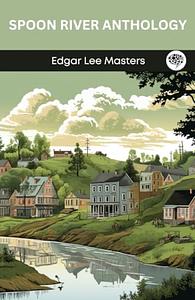Take a photo of a barcode or cover
dark
emotional
reflective
sad
tense
medium-paced
slow-paced
Spoon River Anthology is a thoroughly fulfilling read in which the dead residents of a small town cemetery tell the stories of their lives from beyond the grave. The book is made up of hundreds of short poems, each of which is in the voice of a different speaker from the town of Spoon River. It is a brilliant idea for a poetry collection, reminiscent of a stroll through a cemetery in which you briefly imagine the entire lifetime that is represented by the name on every headstone. And the concept pays off. Every page is a miniature memoir, and each one has a story, a philosophy, or a lesson to share. By the end, the reader has not only met hundreds of Spoon River residents but also feels as though they have an understanding of the town itself.
And that is where true brilliance lies—in the way that all of these individual portraits paint a bigger picture, both of the town of Spoon River and of life itself. Some poems are small narratives that intersect with bigger narratives, others are entirely independent. Often we get several sides of the same story—two sides of an unhappy marriage, conflicting views on local politics, the truth behind misunderstood motives, gossip. Other times, the poem is acutely focused on an individual's personal reflections, regrets, or previously untold secrets. Some people speak of lessons learned or proclaim grand ideologies; others focus on the personal and recall their losses, loves, heartbreaks, and happinesses.
In this edition, the poems are followed by "The Spooniad," a narrative history of Spoon River that one of the characters from the graveyard began writing just before his death. Just this small bit of prose goes a long way to help the reader draw lines between certain characters and make sense of events mentioned by multiple poems. This very short section instantly gave me the impression that a single read had not been sufficient to make all the connections there are to be made in these pages.
Finishing this book, I feel I've only scratched the surface and can already tell that this will be a reread for me—perhaps even instantly. In some ways I feel as though I am only just beginning to know the people of Spoon River; there are still mysteries to be unravelled and lessons to be learned that wait patiently in the pages of Spoon River Anthology .
And that is where true brilliance lies—in the way that all of these individual portraits paint a bigger picture, both of the town of Spoon River and of life itself. Some poems are small narratives that intersect with bigger narratives, others are entirely independent. Often we get several sides of the same story—two sides of an unhappy marriage, conflicting views on local politics, the truth behind misunderstood motives, gossip. Other times, the poem is acutely focused on an individual's personal reflections, regrets, or previously untold secrets. Some people speak of lessons learned or proclaim grand ideologies; others focus on the personal and recall their losses, loves, heartbreaks, and happinesses.
In this edition, the poems are followed by "The Spooniad," a narrative history of Spoon River that one of the characters from the graveyard began writing just before his death. Just this small bit of prose goes a long way to help the reader draw lines between certain characters and make sense of events mentioned by multiple poems. This very short section instantly gave me the impression that a single read had not been sufficient to make all the connections there are to be made in these pages.
Finishing this book, I feel I've only scratched the surface and can already tell that this will be a reread for me—perhaps even instantly. In some ways I feel as though I am only just beginning to know the people of Spoon River; there are still mysteries to be unravelled and lessons to be learned that wait patiently in the pages of Spoon River Anthology .
funny
reflective
sad
slow-paced
slow-paced
emotional
reflective
slow-paced
reflective
slow-paced
emotional
reflective
fast-paced
I must have missed something when they covered this in high school, because this is way more depressing than I remember.



